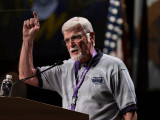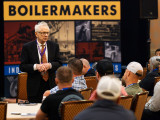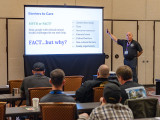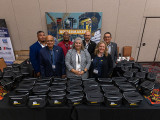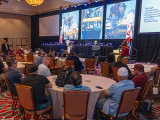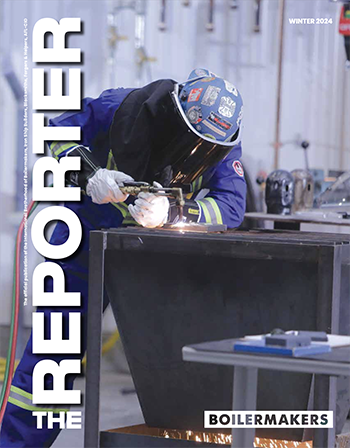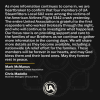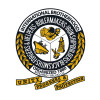The middle class wouldn’t exist without labor. If we unleashed the full power of this movement, there’s not a thing we can’t do.
2024 ISO Conference
View Photo Gallery (8 photos)
Industrial Sector Operations members met in Las Vegas July 30 through Aug. 5 for the annual ISO Conference. This year’s ISO Conference focused on the need for every member to organize. Breakout sessions taught lodge leaders essentials, including organizing, mental health, lodge finances, industry caucuses, steward training, contract negotiations, filing LM and 990 reports and much more.
With a push to grow the membership and help nonunion workers enjoy the benefits of being in the Boilermakers union, the conference stressed the need for every member to organize nonunion workers and engage current lodge membership.
Former International President Warren Fairley, now retired, said we’re better together and stronger as a union when we have more members.
“Better together starts with organizing. We need to start everything with organizing,” he said. “One hundred and forty-four years ago, workers in the industry knew what we know today: We can shake our fist at the wind, or we can organize.”
Fairley detailed Boilermakers’ organizing wins including Doppelmayr OAC. Better yet, he said, was the newly organized Doppelmayr OAC Boilermakers achieving a strong collective bargaining agreement quickly after their vote to unionize.
He also called out shipyard workers at NASSCO in San Diego who had a win in contract negotiations this year.
“Boilermakers in NASSCO know how organizing works,” Fairley said.
They organized for a practice picket during contract negotiation commenced, arranging the picket for the day of a major ship’s christening event. Fairley explained they were flexing their muscles to show NASSCO the union meant business and wasn’t backing down. A few short weeks later, they negotiated a strong contract.
“We have but one choice, and that’s to move forward,” Fairley said. “Brothers and sisters, we’re better together. When we organize, we unite the power of working people and ignite the power of our Boilermakers union.”
Guest speaker United Mine Workers of America President Cecil Roberts fired up Boilermakers to organize and fight for their rights. He recalled the bloody history of the UMWA and their tragedies at the Paint Creek-Cabin Creek strike and the Ludlow massacre. He stressed that even though the owners crushed the workers, the tragic events emboldened the working class to fight for fair wages and treatment, which mine workers eventually fought for and won.
“When coal was at its peak, coal miners were the most organized. We used to make fortunes working for those jobs,” Roberts said. “They were jobs that lifted up the communities.”
But now street drugs and poverty ravage those same communities, he said, and that coincides with the loss of union power.
“I hope you leave here with the understanding of what it means to be a trade unionist,” he said. “And what it means to be middle class. The middle class wouldn’t exist without labor. If we unleashed the full power of this movement, there’s not a thing we can’t do.”
Also addressing the topic of organizing was attorney David Rosenfeld, who represents the Boilermakers union at the union’s legal firm of record, Weinberg, Roger & Rosenfeld. Rosenfeld’s passion for organizing was clear in his plenary talk as he detailed recent National Labor Relations Board decisions that favor unions over employers.
“Workers are pissed off at the boss,” Rosenfeld said. “They see other workers pissed off. Since I started practicing, I don’t think there’s been a more favorable time in organizing.”
He said NLRB decisions under the Biden Administration made organizing more attractive. Certain states are passing laws more favorable to unions, and many new federal laws are positive for unions, such as the CHIPS and Science Act and Inflation Reduction Act.
“New rules make it much quicker to get an election. It makes a lot of difference how quickly you get an election,” Rosenfeld said. “Management goons don’t like it but that’s too bad.”
Due to the NRLB’s Cemex decision, employers are somewhat more cautious now as workers organize, he said. If they intervene in a union election, the employer is forced to recognize the union. Though employers are arguing the case in court trying to get it overturned, right now it’s the law.
“Employers should not be able to benefit from unlawful conduct,” Rosenfeld declared. “If they do anything that affects the election, we’re not just going to order a new election, we’re going to force them to bargain and recognize the union. Organizing is a fabulous opportunity because things have never been better for organizing.”
During the breakout sessions, there were several sessions on how to organize new plants, the Boilermaker’s In-Plant Program as well as bringing more members into established locals.
“Organizing is a unique opportunity,” said Western States Director of Organizing Manny Valenzuela. “It’s a driving force [of unions]. And internal organizing is the way unions secure a strong and solid future for the organization.”
Boilermaker organizers stressed that an employer can file for decertification at any time the union has 50% or fewer people in active membership.
“When a unit is weak, employers can take advantage of it,” said Southeast organizer Walt Westfield. “If the union isn’t doing anything, the union isn’t needed in the employees’ eyes.”
He said that one weak unit inside a shop can hold back other potential targets from unionizing—and that strong units help to organize other facilities.
“We are losing membership faster than we are gaining,” Westfield said. “The future is in jeopardy if we continue down this path. We’re missing out if we’re not recruiting and mentoring people.”
The organizers offered steps on how to make a lodge successful in bumping the numbers higher, with the Boilermakers In-Plant program being one tool. In-Plant is an internal organizing incentive program. Volunteer organizers earn $40 for each recruit and $10 for the local’s program organizer. Since its inception in 1990, more than 26,000 members have been enrolled as Boilermakers through the In-Plant Program. Currently only 13 locals participate in the program.
Ensuring balanced mental health for Boilermakers was a hot topic at this year’s ISO conference. Canadian Director of Health and Safety Jason McInnis and Canadian Health and Safety Rep Blair Allin led members through the Healthy Mind workshop, detailing how to help brothers and sisters in need.
Mental health problems are often only noticeable when a person acts out, said Allin. Mental health exists on a complex continuum, and statistics show that 40% of people will have a mental health issue at some point in their lifetime.
Most common mental health issues in the United States and Canada fall into four areas: depression, anxiety, social phobia and substance use. These all come with stigma which explains why many people never seek help. Yet social support from direct supervisors and coworkers is a protective factor against stress and anxiety. It’s important to look out for coworkers and reach out if their behavior has changed. For example, maybe they’ve become withdrawn where before they were extroverted.
During the closing conference remarks, former ISO Executive Director Jeff Campbell, now IVP-SE, encouraged delegates to take what they learned and disseminate it to their local lodge members.
“If you do that, you have made your local lodge stronger and in turn you’ve made the whole Boilermaker organization stronger,” he said, reiterating the need for union members to organize. “As I hope it’s become clear to you, our conference theme, ‘Better Together,’ is about the importance of organizing and union solidarity. I hope it’s also become clear it’s not just a theme of this conference: Organizing is the primary focus and heart of our union’s priorities.”
He pointed out that the current strike action at Local 1622 in Austintown, Ohio, is a form of organizing. Members are involved in an unfair labor practice strike due to the owner’s illegal activity during negotiations. Campbell noted that strike action is a last resort, but sometimes necessary.
“We obviously prefer to keep everyone working and maintain positive relationships with our employers,” he said. “But sometimes, if a stand needs to be taken, we have no other choice.”
In that area of Ohio, production workers already make less than the national average for similar jobs, and T&W was paying even less than the local average.
“T&W knows this, and they continued to exploit them,” Campbell said. “And when our brothers asked at the bargaining table, the boss told them a raise would only happen over his dead body.”
But, he continued, when Boilermakers stand together as brothers and sisters, the future is bright. “There is nothing a Boilermaker cannot do, and together, there is nothing the International Brotherhood of Boilermakers, Iron Ship Builders, Blacksmiths, Forgers and Helpers cannot do.”

